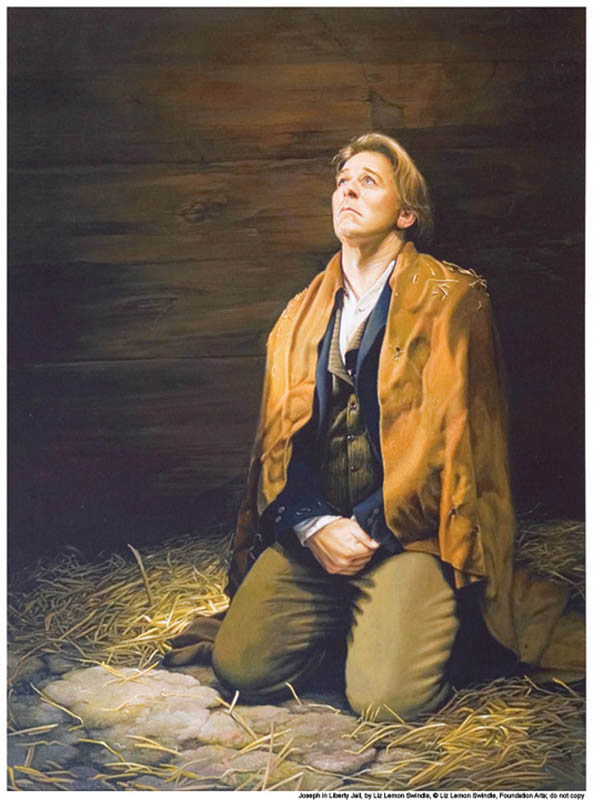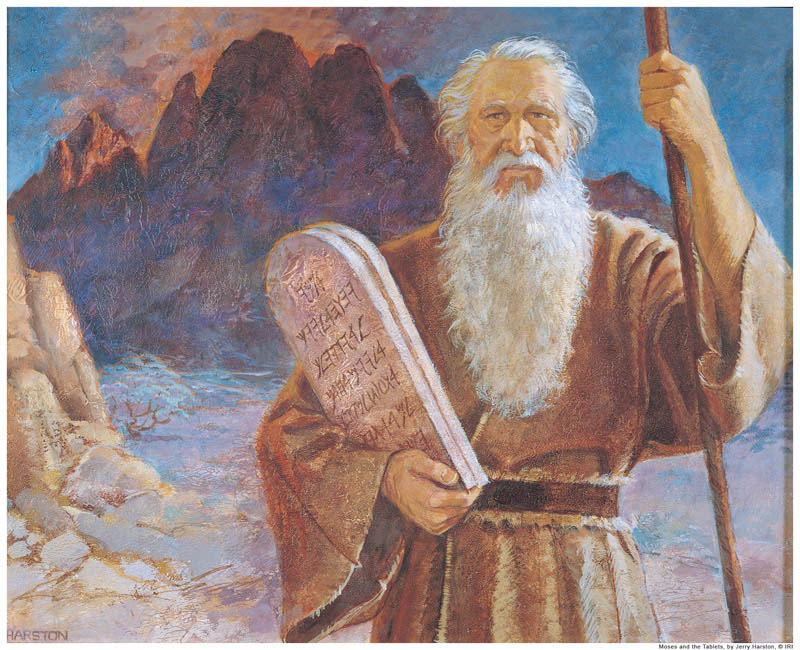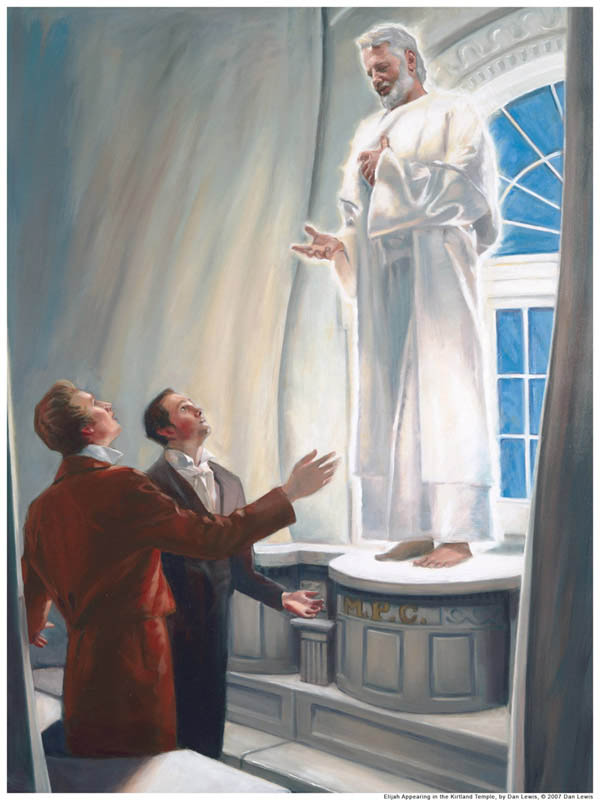If a person is an active, faithful member of The Church of Jesus Christ of Latter-day Saints (often called Mormons), then he or she must have received a personal witness that Joseph Smith was a called and chosen prophet of God. Joseph was called of God to restore the fulness of the gospel of Jesus Christ to the earth in this dispensation. The fulness of the gospel of Jesus Christ was lost from the earth after the Apostles were killed. The cycle of the fulness of the gospel being lost happens in each dispensation. A dispensation consists of a period, usually of hundreds or thousands of years, when a prophet is called to preach repentance and the fullness of the gospel; through wickedness, the fullness is eventually lost until it is restored again in the next dispensation.
 It was revealed to Joseph Smith that his dispensation would be the last dispensation on this earth; the gospel of Jesus Christ will never be lost again, and it will be on the earth when He returns in the Second Coming. Many critics call Joseph Smith a false prophet or simply a fraud, but a close inspection of some of his prophecies is enough to dispel doubt.
It was revealed to Joseph Smith that his dispensation would be the last dispensation on this earth; the gospel of Jesus Christ will never be lost again, and it will be on the earth when He returns in the Second Coming. Many critics call Joseph Smith a false prophet or simply a fraud, but a close inspection of some of his prophecies is enough to dispel doubt.
What is a prophet?
True to the Faith, an official Mormon Church manual, states that prophets have the role of receiving direct revelation from God on behalf of the entire Mormon Church as well as the world. The living prophet is the only one on earth with this authority. A prophet’s main responsibility is to testify that Jesus is the Christ and to preach His gospel. True to the Faith also says that prophets “make known God’s will and true character. They speak boldly and clearly, denouncing sin and warning of its consequences. At times, they may be inspired to prophesy of future events for our benefit.”
While having a prophet on the earth today is a wonderful blessing, it also gives each of us the responsibility to heed his warnings and advice. The scriptures warn that those who do not follow his counsel will be cut off from the presence of God (D&C 1:14–16). The blessings that come from following the prophet are truly great:
“Thou shalt give heed unto all his words and commandments which he shall give unto you as he receiveth them, walking in all holiness before me;
“For his word ye shall receive, as if from mine own mouth, in all patience and faith.
“For by doing these things the gates of hell shall not prevail against you; yea, and the Lord God will disperse the powers of darkness from before you, and cause the heavens to shake for your good, and his name’s glory” (D&C 21:4–6).
 This information shows us that a prophet has many responsibilities and functions, only one of which is prophesying future events, and the purpose of that is for the benefit of the people. Many people have tried to twist some of Joseph Smith’s words to prove he was a false prophet, but only things spoken in the capacity of prophet can be held to this standard. A prophet is, after all, still a man. He is not perfect and has failings and weaknesses just like the rest of us. The scriptures are full of examples of men who were called as prophets who had their own weaknesses: Moses insisted he was slow of speech, so the Lord gave him Aaron as a spokesman; Enoch complained that he was too young for any of the people to listen to and that he was also slow of speech (Moses 6:31); even Isaiah complained that he was unworthy, and he is recognized as one of the greatest prophets of the ages (Isaiah 6:5). More than one time the people hardened their hearts against Moses; it was even his father-in-law, Jethro, who suggested a way to manage the people’s gripings more efficiently.
This information shows us that a prophet has many responsibilities and functions, only one of which is prophesying future events, and the purpose of that is for the benefit of the people. Many people have tried to twist some of Joseph Smith’s words to prove he was a false prophet, but only things spoken in the capacity of prophet can be held to this standard. A prophet is, after all, still a man. He is not perfect and has failings and weaknesses just like the rest of us. The scriptures are full of examples of men who were called as prophets who had their own weaknesses: Moses insisted he was slow of speech, so the Lord gave him Aaron as a spokesman; Enoch complained that he was too young for any of the people to listen to and that he was also slow of speech (Moses 6:31); even Isaiah complained that he was unworthy, and he is recognized as one of the greatest prophets of the ages (Isaiah 6:5). More than one time the people hardened their hearts against Moses; it was even his father-in-law, Jethro, who suggested a way to manage the people’s gripings more efficiently.
In the case of Moses, the Lord gave the people certain commandments, but the people said they were not ready to live such a high law. In response, the Lord took away the higher law (along with the higher priesthood and higher blessings associated with it), but this did not make Moses a fallen prophet or a false prophet. The Lord gave His people commandments they declared they were prepared to live, in preparation for receiving a higher law later. This higher law was reinstated when Jesus Christ came to the earth and fulfilled the law of Moses.
Opponents of Joseph Smith often use the failure of a temple to be built in Jackson County, Missouri, as evidence that Joseph was a false prophet. However, reading the Doctrine and Covenants shows that the people were commanded to build both a temple and Zion up in Jackson County, but, due to their disobedience, they were unable to fulfill that commandment. The Lord withdrew that commandment and gave them another, while stating that at some future date a temple would be built there and that Zion, the New Jerusalem, would in fact be built there. This prophecy has not yet been fulfilled, but that does not mean Joseph Smith was not a prophet. The Lord gave further instruction which delayed the fulfilling of the original, but it was due to the people’s behavior and not Joseph’s failure to receive true revelation.
Prophecies Received through Joseph Smith
It is important to remember that when a prophet receives revelation, he is not dictating to God what will happen; rather, God is showing the prophet a brief glimpse of future events and making known His will; in this case, there is no difference between God’s words and the prophets words (D&C 1:38). Joseph Smith received countless revelations, and many of them were fulfilled in his lifetime or shorty thereafter, though some have still not been fulfilled. Most of the revelations he received which have not yet been fulfilled are regarding the Second Coming of Jesus Christ and what will happen before He comes again. Below is a short list of some of the prophecies Joseph did receive which have been fulfilled and historically documented. Though Joseph received many revelations by himself, for several, there were other people with him who heard and witnessed the same events. None of these people, even though some left the Mormon Church later, ever denied what they had seen and heard, and are another testament to the fact that Joseph Smith was who he claimed to be.
- Joseph Smith’s name would be “had for good and evil”: When Joseph Smith was just 14 years old, he prayed to know which of the many Christian sects of his day he should join. In response to his prayer, he received the First Vision, in which he saw both God and Jesus Christ as separate beings. From this he learned that the traditional doctrine of the Trinity was wrong about the nature of God. Three years after this vision, Joseph received another visitation, this time from an angel named Moroni who had lived in the Americas around 400 A.D. At this time, Moroni told Joseph that God had a work for him to do and that his name “should be had for good and evil among all nations, kindreds, and tongues, or that it should be both good and evil spoken of among all people” (Joseph Smith History 1:33). This prophecy has been and continues to be fulfilled.
 The return of Elijah: Jewish tradition has held for centuries that Elijah would return. In another visit from Moroni, it was revealed to Joseph that the prophecy contained in Malachi 4:5 was soon to be fulfilled, and it was on April 3, 1836, when Elijah appeared to both Joseph Smith and Sidney Rigdon in the Kirtland Temple.
The return of Elijah: Jewish tradition has held for centuries that Elijah would return. In another visit from Moroni, it was revealed to Joseph that the prophecy contained in Malachi 4:5 was soon to be fulfilled, and it was on April 3, 1836, when Elijah appeared to both Joseph Smith and Sidney Rigdon in the Kirtland Temple.- The growth of The Church of Jesus Christ of Latter-day Saints: Joseph Smith declared that the prophecy contained in Daniel 2 of the stone being cut out of the mountain without hands rolling forth until it filled the whole earth pertained to the growth of the kingdom of God in the last days (which is our dispensation). The small church which Joseph Smith organized through the power of and under the direction of Jesus Christ began with just 6 members on April 6, 1830. Within ten years, its membership had reached 30,000, despite heavy persecution all around them. By 1963, the Mormon Church had reached more than 2 million members, and today it has more than 14 million members around the world, in nearly every nation. It is truly filling the whole earth.
- Prophecies on war: Joseph Smith foresaw the American Civil War decades before it occurred, even years before many of the conflicts even arose which led to the war. On September 6, 1842, he declared:
I prophesy, in the name of the Lord God, that the commencement of the difficulties which will cause much bloodshed previous to the coming of the Son of Man will be in South Carolina.
It may probably arise through the slave question. This a voice declared to me, while I was praying earnestly on the subject, December 25th, 1832 (D&C 130:12-13).
In 1832, Joseph Smith received this revelation: “Verily, thus saith the Lord concerning the wars that will shortly come to pass, beginning at the rebellion of South Carolina, which will eventually terminate in the death and misery of many souls;
And the time will come that war will be poured out upon all nations, beginning at this place.
For behold, the Southern States shall be divided against the Northern States, and the Southern States will call on other nations, even the nation of Great Britain, as it is called, and they shall also call upon other nations; and then war shall be poured out upon all nations (Doctrine and Covenants 87:1-3).”
These prophecies foretell of not only the American Civil War, but also wars on a worldwide level which would cause immeasurable havoc and cost countless lives with wars in Russia, China, and eventually the two World Wars. This was fulfilled in the Civil War in America, including the detail of the war beginning in South Carolina. Though the war became inevitable and obvious to everyone later, at the time Joseph prophesied it would happen, no one foresaw such events.
- Personal imprisonment in and survival of Liberty Jail: Due to a variety of factors, the Saints were being heavily persecuted in 1838 in Missouri and Governor Lillburn F. Boggs issued an extermination order expelling the Saints from the state under threat of death. Joseph Smith and other church leaders were arrested on false charges and were held in Liberty Jail during the coldest months of the winter in a dank basement, barred from helping their people when they were in such need. Joseph prophesied when arrested “the word of the Lord came to me last night that . . . whatever we may suffer during this captivity, not one of our lives shall be taken” (Dona Hill, Joseph Smith: The First Mormon, Doubleday and Company, Garden City, NY, 1977, p. 244). Though he and several others were kept in such stark conditions for months, the jailer eventually allowed them to escape and none of them perished.
- Joseph Smith even predicted his own death: Joseph Smith recorded in his journal on Saturday, June 22, 1844: “I told Stephen Markham that if I and Hyrum were ever taken again we should be massacred, or I was not a prophet of God.” This was Joseph’s last entry in his journal. On June 27, he and Hyrum were murdered by a mob during their imprisonment (which they went to willingly) in Carthage Jail. Joseph and Hyrum were both killed, while the others present survived. On his way to Carthage Jail, Joseph commented, “I am going like a lamb to the slaughter.” He said this with confidence that he was about to be martyred, even though he had been promised safety by the highest authorities in the region.
Joseph Smith was a remarkable man, but being remarkable is not enough to make one a prophet. He was called of God to restore the gospel to the earth. He was called to endure many sufferings and was even called to become a martyr for his faith. He was God’s tool and mouthpiece on the earth to teach God’s children and declare God’s will to them. Joseph Smith was a man of integrity and faith. Though the prophecies listed offer only a minimal sampling of the prophecies he received, they do show that he received the word of God and preached it fearlessly to the world.

 Watch a video about the restoration of the gospel on lds.org
Watch a video about the restoration of the gospel on lds.org